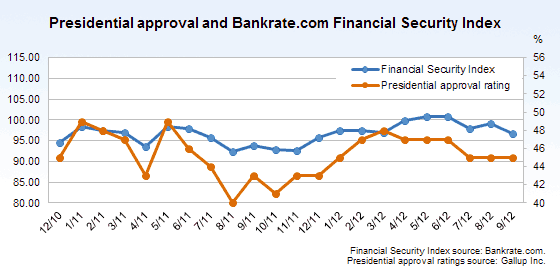Anyone watching the U.S. economy or the presidential election closely might want to get X-rayed for whiplash.
Just as economic expectations have fluctuated between an accelerating recovery and a backslide into recession, so too have the candidates' fortunes in what's already been an eventful campaign.
In June, Americans were evenly split, 21 percent to 21 percent, in Bankrate's Financial Security Index over whether their personal financial situation would be better under presidential candidate Mitt Romney or a second term under President Barack Obama. Since then, Obama has opened up a lead, with 29 percent saying their finances would be better if he were re-elected versus 20 percent who said a Romney victory would improve their personal finances.
RELATED: Middle Class? How to Survive and Thrive
Bankrate's survey was conducted by Princeton Research Associates International via landline and cellphone interviews from Oct. 4 to Oct. 7 and has a margin of error of plus or minus 3.7 percentage points.
Matthew Singer, an assistant professor of political science at the University of Connecticut, says the slight Obama advantage is a reflection of economic fundamentals. While the economy has been far from spectacular, those doing well enough financially to support the incumbent outnumber those willing to take a chance on a challenger by a slim margin, he says.
"People who think that the economy is rebounding a little are optimistic about it continuing under Obama, whereas people who think it's bad are really hoping for change," Singer says.
In fact, in our FSI poll, of those who reported being better off financially compared to a year ago, 45 percent said they'd be better off in a second Obama term, versus just 9 percent who said they'd do better under Romney. For those who reported being worse off, 35 percent said they'd do better under Romney, versus 18 percent for Obama.
Personal finances a major factor
One thing that hasn't changed in Bankrate's FSI poll is Americans' belief that personal finances are a big election issue. In a Bankrate survey conducted this month, 62 percent of Americans said their personal finances will be either an important factor or the most important factor in how they vote, up from 59 percent in June.
Many respondents to the FSI continue to express anxiety about their jobs and their overall financial picture. So it's no surprise voters still view personal finances as an important election issue, Singer says.
"People who are feeling less secure about their job ... they're going to be focused on the economy quite a bit. They're very scared, and my guess is a lot of the people who are 'about the same' are still very scared about their jobs," Singer says. "The agenda and the election are being driven a lot by that personal economic fear."
Americans have shifted somewhat on how they feel about the candidates' abilities to improve their financial lot. In our most recent poll, 45 percent said the outcome of the election wouldn't make a big difference to their finances, down from 50 percent last time.
That shift is what you'd expect as campaigns kick into high gear and devote millions of dollars to convincing voters their candidate can make a difference, Singer says.
It's MY economy, stupid
While election prognosticators pour over every piece of macroeconomic data they can get their hands on during election season, voters tend to pay more attention to the small picture, says Erik Snowberg, a professor of economics and political science at the California Institute of Technology.
"People do care about what's happening to them, what's happening to their friends, what's happening to their family, what's happening to people who are similar to them," Snowberg says. "When you ask people their opinion of an economic indicator like unemployment, their report of what they think the unemployment rate is seems to reflect their own personal circumstances rather than the national numbers."
And while campaigns like to focus on whether you're better off than you were four years ago, that's a little further back than most people tend to think when considering a president's performance, Snowberg says. Rather, how a voter's personal finances have changed over the year leading up to the election exerts a more powerful influence over their decisions, Snowberg says.
"What seems to matter the most is sort of the one-year change in the year before the election, especially what happens in the second and third quarter of the election year," Snowberg says. "The growth and unemployment rate has been doing better than it was a year ago, so there's been a slight improvement."
That one-year horizon may be why the FSI continues to track so closely with Gallup's presidential approval rating, a good proxy for the incumbent's share of the vote in November. Since its inception, the FSI and presidential approval have had a correlation of 0.714. A perfect correlation is one.
"There is a strong correlation between presidential approval ratings and how Americans feel about their own financial security, particularly as the economy slowly recovers from the Great Recession," says Greg McBride, CFA, Bankrate's senior financial analyst.
Still, economic fundamentals aren't the only factor in the race, Snowberg says. With fundamentals dictating the vote split almost exactly evenly, get ready for a close election in November.
"We're sort of in the margin of error of what the economy says should happen, so something that can swing voters a little bit one way or the other could be decisive," Snowberg says.
 |




